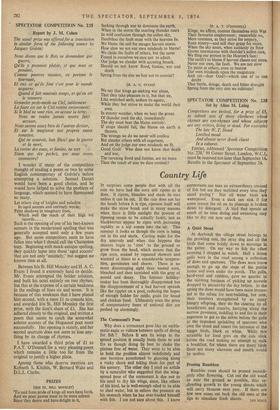The usual prize was offered for a translation in similar
form of the following sonnet by Jacques Grdvin: Nous disons que le Rois ne demandant que guerre, Qu'ils y prennent plaisir, et que nous ce pendant, Comme pauvres vassaux, en portons le tourmant, Et eux ce qu'ils font c'est pour le monde acquerre.
Quand it fait mauvais temps, et qu'on oil le tonnerre Grumeler pesle-mesle au Ciel, ubitement La faute est stir le Ciel remise entierement ; Si le bled ne vaut rien, on accuse la terre.
Nous ne voulos jamais nostre faict accuser, Nous savons assez bien de l'autruy deviser, Et sur le magistrat nos propres rnaux remettre. Qui ne scauroit, bon Dieu! que la guerre et la mort, La ravine des eaux, et famine, ne sort - Sinon que des pechez, que nous osons commettre?
I wonder if many of the competitors thought of reading a poem or two by some English contemporary of Grdvin's before attempting a solution. Samuel Daniel would have been a good choice, and he would have helped to solve the problem of language, which seemed to have flummoxed so many.
Let others sing of knights and paladins
In aged accents and untimely words; • Paint shadows in imaginary lines, Which well the reach of their high wit records ....
Such is the opening of one of his best-known sonnets in the modernised spelling that was generally accepted until only a few years ago. But some competitors seem to have fallen into what I should call the Chatterton trap. Beginning with mock-antique spelling, they quickly lapse into those `aged accents' that are not only 'untimely,' but suggest no known time at all.
Between Iris St. Hill Mousley and H. A. C. Evans I found it extremely hard to decide. Mr. Evans attempted the bolder solution, and built his octet. entirely on two rhymes, but this at the expense of a certain weakness in the endings of lines six and seven. It is because of this weakness that I have placed him second, with a mere £1 to console him, and awarded Iris St. Hill Mousley the first prize, with the lion's share of £3. She has adhered closely to the original, and written a poem that seems to catch the somewhat solemn accents of the Huguenot poet most successfully. Her opening is stately, and her second quatrain does not seem to lose any- thing by its change of rhymes.
I have awarded a third prize of £1 to P.A.T. O'Donnell for a very pleasing poem which remains a little too far from the original to justify a higher place.
Miong those who deserve mention are Keflneth S. Kitchin, W. Bernard Wake and D.L.L. Clarke.
PRIZES (IRIS ST. HILL MOUSLEY) 'Tis said from pride of kings all wars have birth, And we poor pawns must to its woes submit Since they desire and have delight in it, Seeking through war to dominate the earth. When in the storm the snarling thunder roars In wild confusion through the sullen sky, Doubtless the fault must with the heavens lie. We blame the soil for meagre harvest stores. How slow we are our own misdeeds to blame! We chide the faults of others, but the same Found in ourselves we care not to admit. Our judge we slander with accusing breath. Should we not know flood, famine, war and
death Spring from the sins we fear not to commit?
(H. A. C. EVANS)
We say that kings go seeking war alone,
That they take pleasure in it, but that we, Like wretched serfs, endure its agony, While they but strive to make the world their own.
In stormy weather, when we hear the groan Of thunder rend the sky, immediately
The sky must bear the blame entirely:
If crops should fail, the blame on earth is thrown.
The wrongs we do we never will confess But slander others with all eagerness, And on the judge our own misdeeds we fit.
Good Godl Who does not know that death and war,
The ravening flood and famine, are no more
Than the result of sins we dare commit?
Kings, we affirm, content themselves with War Their favourite employment; meanwhile we, Mere counters, as they strive for empery, Reap misery—and still they grasp for more. When the sky sours, when suddenly its floor Grows murmurous with thunder's sullen race, We fling our protest in the Heaven's face: The earth's to blame if harvest cheats our store. Never our own, the fault. We are not slow To point at others, even to bestow
Our own misdeeds upon the magistrate. And yet—dear God!—which one of us can doubt That battle, deluge, death and bitter drought Spring from the very sins we cultivate?


































 Previous page
Previous page